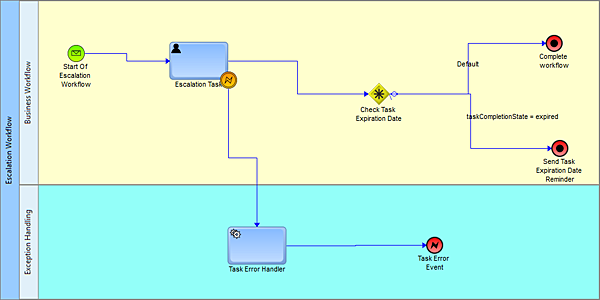Default Escalation Process Workflow
The default escalation process model has the following workflow:
.
 Start of Escalation Workflow
Start of Escalation Workflow. This start message step is configured to receive the ProcessEscalation document type delivered as a JMS message, which triggers a new process instance. The document is published from a business rule which gets triggered by an EDA event emitted on the Business Process dashboard.
 Escalation Task
Escalation Task. This escalation task is configured to process the business data in the pipeline, provided by the ProcessEscalation document type. It is configured to use the default escalation task application, EscalationTask, which must be available in
My webMethods. This step requires data mapping. For more information, see
webMethods BPM Process Development Help. The task is started by the process, and it will remain active until it reaches a defined due date (status = Expired), or if a user completes the task. Unless an error occurs, the task output transitions to the following Check Task Expiration Date step. If an error occurs, the step’s intermediate boundary interrupting error event passes the error to the Task Error Handler step.
 Check Task Expiration Date
Check Task Expiration Date. This complex gateway step examines the task status. If the status is Completed, the workflow transitions to the Complete workflow end terminate step. If the status is Expired, the workflow transitions to the Send Task Expiration Date Reminder end terminate step. The logic is implemented as an IF condition on the step, and on the transition to the Send Task Expiration Date Reminder end terminate step.
 Complete workflow
Complete workflow. If the process completes normally, this end terminate step marks the process status as Completed.
 Send Task Expiration Date Reminder
Send Task Expiration Date Reminder. If the Escalation Task status changes to Expired, this end terminate step completes the process. If you want to send an expiration notification message, you can create an appropriate document type and change this to an end message step and configure it to send the message. You will also have to create your own application to process this message. You can also choose to implement notifications using the pre-configured task event actions in the Escalation Task.
 Task Error Handler
Task Error Handler. This service task step handles errors generated by the Escalation Task step. It is not configured with a target Integration Server service or web service to process the error. You must create such a service and configure this step to call it if you want to provide error handling. You can remove this step and its following end terminate step if you choose to implement notifications using the pre-configured task event actions in the Escalation Task.
 Task Error Event
Task Error Event. If the Escalation Task generates an error, this end error step ends the track in the process and throws an error. If you want to send an error message, you can create an appropriate document type and change this to an end message step and configure it to send the message. You will also have to create your own application to process this message.

